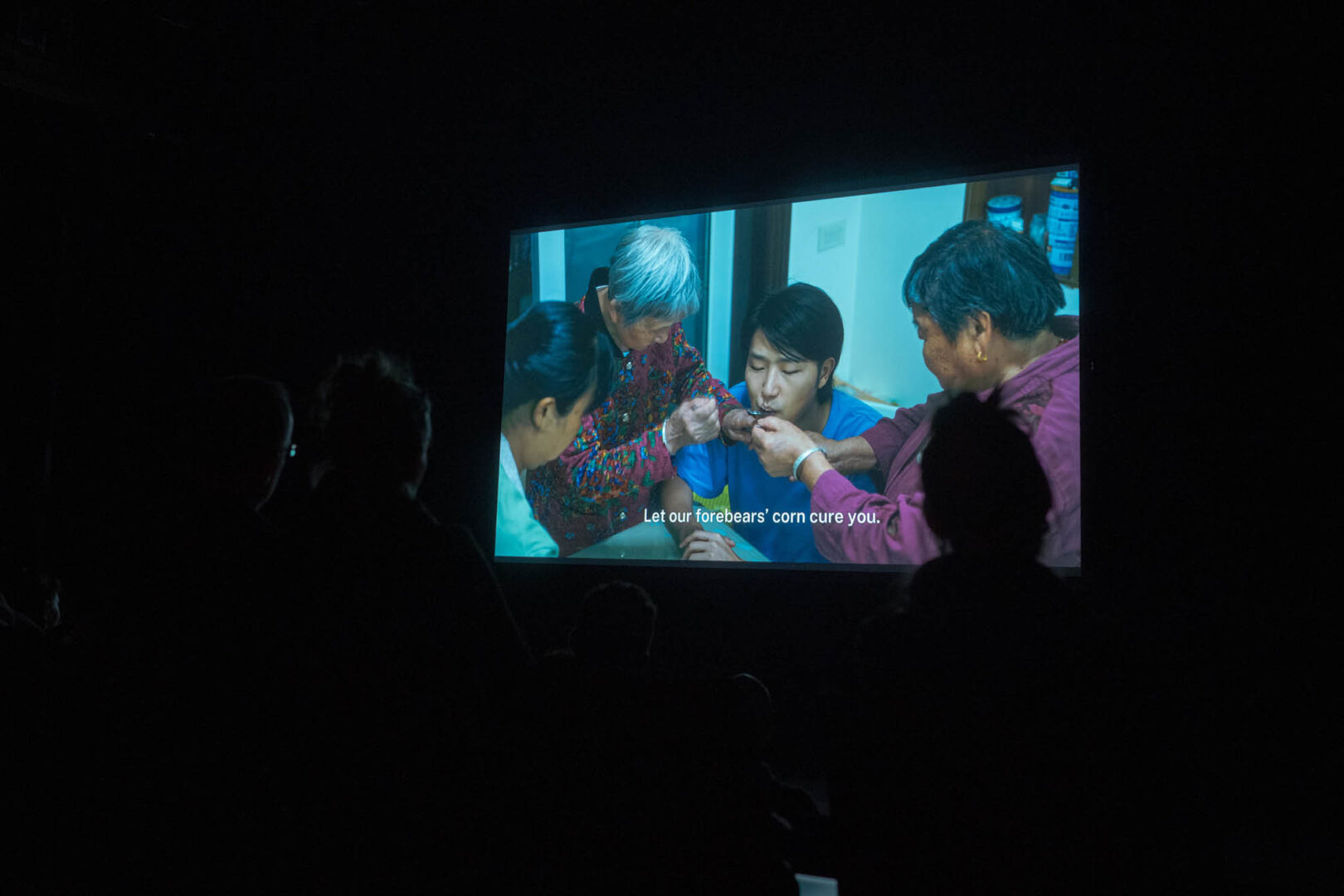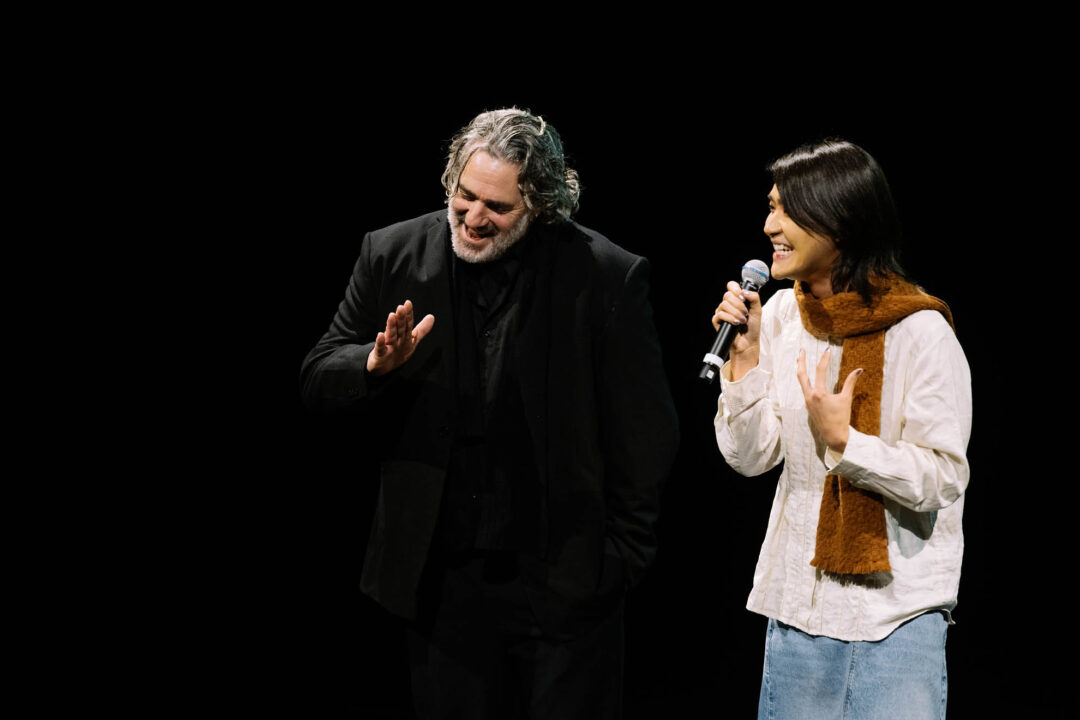Text: Diana d'Arenberg
Photos: Camille Blake

Text: Diana d'Arenberg
Photos: Camille Blake

Growing up, Chinese-born, Ohio-based filmmaker Hao Zhou had limited access to films, let alone positive portrayals of queerness on screen. Consequently, for the past decade, the University of Iowa graduate has used film as a vehicle to explore and spotlight queer, marginalized, and diasporic stories and characters, often in peripheral or overlooked spaces.
In 2014, while still a 21-year-old college student in Chongqing, Zhou made their first feature film, Ye (The Night), about young, queer sex workers in China searching for intimacy in the urban backstreets and alleyways of Chongqing. Premiering at the 64th Berlin International Film Festival, where the film was described as having “the poetic intensity of Jean Genet,” The Night was later adapted as a stage performance at the Tokyo Metropolitan Theatre in 2017. Their 2023 film, Here Hopefully, featured a nonbinary aspiring nurse from China striving to build a gender-affirming life in rural Iowa.
An alum of the Berlinale Talents and the Cannes Résidence, Zhou has also presented films at SXSW, Hot Docs, HKIFF, and Images Festival, among others, and was a 2021 Student Academy Award medalist for their film Frozen Out (2021). Mixing narrative, documentary, and experimental modes, Zhou makes films about other people’s lives—but they also turn the lens on themselves. Over the summer of 2024, Zhou returned to their hometown in Chongqing, Southwest China, to film their documentary Correct Me If I’m Wrong.
In post-production at the time of writing, the autobiographical documentary sees the writer and filmmaker taking on a much more personal and intimate project based around their own family’s interventions to “fix” Zhou’s queerness. Although homosexuality is neither a crime nor officially regarded as an illness in China (Chinese authorities removed homosexuality from its list of diseases in the Chinese Classification of Mental Disorders, a national clinical guide, in 2001), many LGBTQ people are nonetheless pressured or forced to undergo some form of “conversion therapy” by their families. In some cases, hospitals and private clinics offer such programs, while in other cases, such as Zhou’s, more folk and traditional approaches are sought by family members.
For years, the filmmaker’s grandmother has expressed a desire to correct her grandchild’s queerness before Zhou decided to document the journey depicted in Correct Me If I’m Wrong. Working with a small team, Zhou captures a variety of folk, mystical, and traditional Chinese medicine interventions—from shamans and fortune-telling to blood cupping. “I grew up seeing shamans coming to our house. My grandmother would bring them to fix any issues,” Zhou explains their upbringing. “I realized that even if I said ‘no’ to her, she would still hire shamans to do those things to me. So, I thought, why don’t I go along with what she wants, and I can document that process and my relationship with her and my family and see how this relationship can shift throughout the process?” Zhou says of the documentary’s genesis. “When I was a kid, I was very feminine… My grandmother believes in a potential female spirit inside me, and she uses her own mix of methods to get rid of this female energy or spirit… and balancing my yin and yang.” They cite blood cupping as one example of a treatment designed to “bring out the feminine energy through sucking out the ‘bad’ blood.”


Although free of the religious stigma associated with homosexuality, Chinese society, like many others, firmly upholds conformity and traditional values, where heterosexual marriage and child-bearing is strongly favored. “My family and grandma want to fix me because they think that is the only way to be happy. There is no other version of happiness provided to them,” Zhou explains. “It is really coming from a place of love from my family which also makes it hard to disconnect from them and shut them down or not have a dialogue with them.” Zhou notes that their circumstances are quite different than in a lot of western families where issues over queerness come from a belief that “it’s a sin.” “It’s like you’ve committed a crime—and that’s not the case with my family.”
The relationship between Zhou and their family, particularly with their grandmother, is not only important to the filmmaker but also central to the film. This relationship, and the struggle to communicate and understand each other across generations, drives the documentary forward. Here, film is employed as a medium to bridge distance and to connect with their own family and audience. The filmmaking process serves as an opportunity for healing and opens a new avenue for dialogue. “I need to have a device to continue to push me to talk about these things,” the filmmaker explains. “I feel like without this external force, I was trying to avoid communicating with them, especially expressing the queer side of me.”
For many people, Zhou notes, the most direct response to having one’s identity challenged or rejected is to engage in conflict, and in the case of family members “people would just shut each other down and disconnect. But once they’ve tried all these methods to fix me, and failed, maybe it’s then easier for my family to accept the reality of who I am.”
A multi-layered journey of love and transformation, Correct Me If I’m Wrong explores the intersection of modernity and tradition to navigate personal and familial history through testing social and personal boundaries. “My family want to correct me, but I also want to correct them in some way,” Zhou muses. “I hope that there’s a mutual correction, but it’s more important for me to let them understand me a bit better.” Offering a window into the filmmaker’s world, Zhou hopes the film presents an opportunity for greater understanding. “Documentaries like this are like catalysts for greater dialogue. At the core of this process I want to make connections.”
You are currently viewing a placeholder content from Vimeo. To access the actual content, click the button below. Please note that doing so will share data with third-party providers.
More InformationYou are currently viewing a placeholder content from Facebook. To access the actual content, click the button below. Please note that doing so will share data with third-party providers.
More InformationYou need to load content from reCAPTCHA to submit the form. Please note that doing so will share data with third-party providers.
More InformationYou are currently viewing a placeholder content from Instagram. To access the actual content, click the button below. Please note that doing so will share data with third-party providers.
More InformationYou are currently viewing a placeholder content from Instagram. To access the actual content, click the button below. Please note that doing so will share data with third-party providers.
More InformationYou are currently viewing a placeholder content from X. To access the actual content, click the button below. Please note that doing so will share data with third-party providers.
More Information